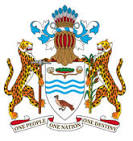Originally a Dutch colony in the 17th century, by 1815 Guyana had become a British possession. The abolition of slavery led to settlement of urban areas by former slaves and the importation of indentured servants from India to work the sugar plantations. The resulting ethnocultural divide has persisted and has led to turbulent politics. Guyana achieved independence from the UK in 1966, and since then it has been ruled mostly by socialist-oriented governments. In 1992, Cheddi JAGAN was elected president in what is considered the country's first free and fair election since independence. After his death five years later, his wife, Janet JAGAN, became president but resigned in 1999 due to poor health. Her successor, Bharrat JAGDEO, was reelected in 2001 and again in 2006. Early elections held in May 2015 resulted in the replacement of President Donald RAMOTAR by David GRANGER.
Guyana is a parliamentary republic.
Members:
Resources
Displaying 1 - 5 of 34Deeds Registry Authority (Amendment) Act, 2017 (No. 15 of 2017).
This Act amends the Deeds and Commercial Registries Authority Act in section 5 concerning the composition of the Governing Board of the Authority, and by making minor modifications to sections 6 and 10.
Amends: Deeds Registry Authority Act, 1999 (Cap. 5:11). (2007)
Protected Areas Act 2011 (No. 14 of 2011).
This Act provides for the establishment of the Protected Areas Commission, the Protected Areas Trust and a Trust Fund and empowers the Minister to declare national protected areas. It applies to the territorial sea, exclusive economic zone, fishery zone and continental shelf as defined in the Maritime Zones Act 2010. The Act alos provides with respect to the National Protected Areas System and allows village councils to apply to the Commission for village lands or any part thereof to be recognised as an Amerindian protected area.
Constitution of Guyana 1980 (rev. 2016)
The constitution was adopted by Parliament.
Plantation (Proprietors) Government Loans Act (Cap. 68:07).
This Act establishes the right of a joint owner of land to recover an amount paid as potion of repayment of a government loan charged upon a plantation in co-ownership. Conditions for the right of summary recovery are acting in good faith of the paying co-owner and for purposes of preventing proceedings by parate execution being taken against the plantation.
Deeds Registry Authority Act, 1999 (Cap. 5:11).
This Act establishes the Deeds Registry as a body corporate. This authority shall carry out functions assigned to it under various laws including the Deeds Registry Act. The Registrar and the Deputy Registrar shall be appointed by the Minister. The Act also establishes an Advisory Board of the Registry. The Board shall advise the Minister and the Registrar. The Act also confers regulation-making powers upon the Minister for purposes of this Act and the Deeds Registry Act.
Amended by: Deeds Registry Authority (Amendment) Act, 2017 (No. 15 of 2017). (2017-06-28)



